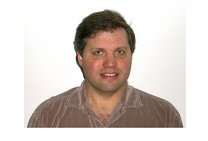Oral history interview with Michael A. Caudy
- 1996-Nov-08 – 1996-Nov-10
Michael A. Caudy was born and grew up in Columbus, Ohio. His parents divorced when he was two, and for about eight years he lived with his mother and sister; for some of that time his grandparents also lived with them. When he was about ten, his mother married a theoretical physicist. His stepfather, whom he calls a brilliant scientist, had—at least subconsciously—a major influence on Caudy's interest in becoming a scientist. The more immediate moving force was a summer job for Caudy when he was in high school: a neighbor was head of a veterinary pathology lab at Ohio State University, and he hired Caudy to work as a technician. When he entered the Ohio State University, Caudy had been playing rock guitar for years; in college he discovered classical guitar, and then he became interested in building guitars. He also liked to read English literature, so he took longer than usual to complete his undergraduate work, attending school part time, reading, playing and studying music and dance, and doing some science, until he finally settled on an English education major. After college he spent some time teaching in different elementary and junior high schools to learn about alternative methods of teaching. During these years he maintained a serious interest in science, primarily physics and mathematics, until he entered the biophysics graduate program at Ohio State. After a year there he transferred to the University of California, Berkeley, to David Bentley's lab, to study theoretical biophysics and neurobiology, with a focus on developmental neurobiology. After describing his experiences growing up in the early 1970s, Caudy compares and contrasts the environment at Ohio State and Berkeley. He then explains his reasons for accepting a position at Weill Cornell Medical College and describes his lab there. He discusses his research in mammalian and Drosophila genetics; he describes his work on the hairy gene and its binding sites, lamenting the difficulty of finding funding. He analyzes the academic and clinical organization of Weill Cornell Medical College, and the pressures on medical schools in general. He explains his lack of interest in working for private industry. He shares his future research agenda while philosophizing about the need for scientists to have time to ponder larger questions. He explains the specifics of a functional lab, including funding and size, and stresses the need for creativity and innovation within it. Although Caudy experiences pressures in his career he claims those pressures have not detracted from his love of science. He concludes the interview by suggesting policies that might further the cause of scientific discovery.
Access this interview
By request 1 PDF Transcript File and 12 Audio Recording Files
Fill out a brief form to receive immediate access to these files.
If you have any questions about transcripts, recordings, or usage permissions, contact the Center for Oral History at oralhistory@sciencehistory.org.









